

 |
Audie
Leon Murphy American Hero |

|
 |
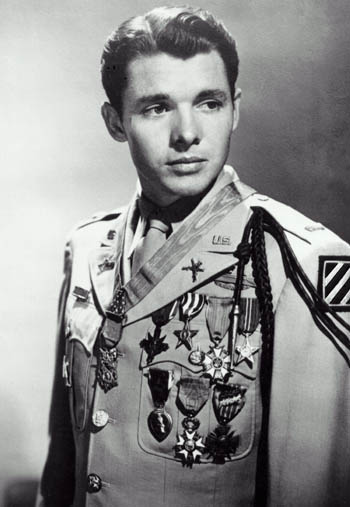 |
 |

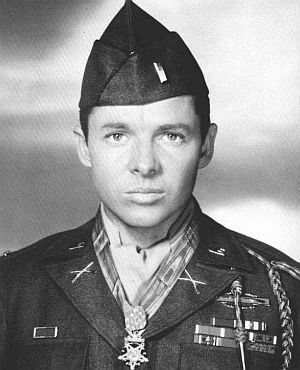 |
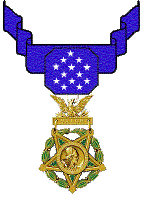 Medal of Honor |
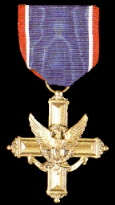
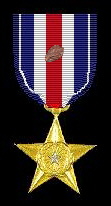
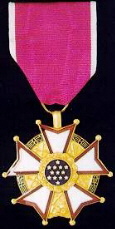
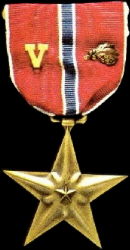
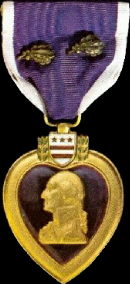
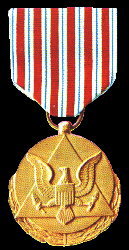
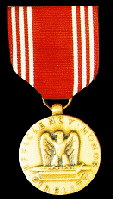

|
Audie Murphy was born on June 20, 1924 near Kingston, Texas, the 7th of 12 children of poor sharecroppers. Life in the Murphy household was poor and very hard. Growing up, Audie picked cotton and became very skilled with a rifle to hunt small game to help feed the family. Audie's father left the family in 1940 and his mother died in 1941, so at age 17 both of his parents were gone, leaving Audie to care for his younger siblings When the United States declared war in December of 1941, Audie rushed to enlist. He first attempted to join the Marines where he was turned away for being too small. Audie in 1941 was 5' 5" tall and weighed only 110 lbs. Undeterred, he attempted to join the Army Paratroopers and was again turned away. Finally, Audie enlisted in the Regular Army as an infantryman. Upon completion of basic recruit training at Camp Wolters, Texas, Audie went through Advanced Infantry Training at Fort Meade, Maryland. Finally, Audie was shipped overseas where he joined B Company, 1st Battalion, 15th Infantry Regiment, 3rd Infantry Division which was operating in North Africa. He arrived in February of 1943. Audie saw little action in N. Africa as the war there was in the mopping up phase. 5 months later, Audie received his baptism of fire as he landed in Sicily on July 10, 1943. Audie's captain did his best to keep the small soldier from fighting by making him a runner. However, Audie had other plans and he slipped off to join any patrol he could. Audie soon distinguished himself under fire as a resourceful and effective soldier. Finally the Captain gave up and promoted Audie to Corporal. Audie's next action was in the invasion of Salerno on the Italian mainland. Here Audie again excelled as a soldier. While leading a night patrol, Audie and his men ran into a group of German soldiers. After fighting their way out of an ambush, they took cover in a rock quarry. The Germans sent a squad of soldiers in to get them out but were stopped by intense machine gun and rifle fire. Three of the Germans were killed and several more captured. For his actions at Salerno, Audie was promoted to Sergeant. Audie missed the next invasion at Anzio due to a serious attack of malaria. He soon recovered and rejoined his unit just in time for some of the fiercest fighting of the war. For three days the Americans fought to escape their beachhead but were unsuccessful. The situation deteriorated to a stalemate with neither side gaining. This went on for months and the soldiers dug in for the long haul. Audie volunteered for numerous patrols and his unit came under artillery fire almost every night. Audie was soon evacuated from the front with another severe attack of malaria. Within 10 days he was back at the front. Soon after the unit was pulled out for a short rest. Audie was offered a battlefield commission to 2nd Lieutenant. Not wanting to leave his unit, he refused the promotion. Once back at the front, Audie quickly surveyed his area and discovered that there was only one route the enemy armor could pass through. Audie heavily mined the area. When the Germans attacked, the lead tank hit a mine and blocked the road completely. The Germans withdrew but Audie wanted to ensure that they could not move the damaged tank. Taking a small patrol forward, Audie ordered them to cover him while he approached the tank. He first threw two Molotov cocktails at the tank. Neither ignited. A grenade he tossed inside was ineffective. The Germans guarding the tank began firing at him. Audie next used rifle grenades and finally managed to knock the tank treads off one side. For this action, Audie was awarded the Bronze Star. On May 23, the 3rd Division finally broke out of the Anzio beachhead. After fighting their way to Rome, the Division was then ordered to a rear area for amphibious training. On August 15, 1944, the Division made yet another landing, this time in Southern France. Three hours after landing, Audie's battalion was tasked with capturing an enemy artillery position high up on a ridge. The men of 1st Battalion slowly advanced up the slope, struggling all the way. As they reached the top, the Germans opened fire with deadly results. Every avenue of approach was covered by machine guns. Audie, whose platoon had been in the rear of the lines, moved forward, out of the line of ambush, and took stock of the situation. Half the unit was pinned down, the other half was being decimated by enemy fire. Audie could not reach the enemy positions with grenades and his carbine was ineffective, Slowly, he crawled down the slope and reached the heavy weapons platoon. Commandeering a .30 cal machine gun, Audie crawled back up the slope. Setting up the gun, he opened fire and quickly killed two Germans. With only one belt of ammunition, Audie used short bursts and forced the German gunners to cease firing and duck down. Once out of ammunition, Audie and another soldier, Private Lattie Tipton, charged the first enemy position and quickly silenced it. As they prepared to charge the next position, Tipton noticed a German soldier waving a white flag. Standing up to take the soldier prisoner, Tipton was killed by a single rifle bullet. Audie was enraged by this act and picked up the German machine gun. He first charged one enemy position with grenades and the gun and killed both enemy soldiers in it. He charged several more positions and killed all of the soldiers within them. When it was over, they discovered that the artillery they had been sent to silence was a fake. They had been suckered into an ambush. For his actions, Audie was awarded the Distinguished Service Cross. As the 3rd Division continued their advance, Audie was wounded in the heel by a shell fragment. He received the Purple Heart and spent two weeks in an Evac hospital. After returning to his unit, they were ambushed while on patrol. Audie, who crawled out of the ambush zone, charged the enemy position and using two hand grenades, silenced it. For this action, which saved the lives of this patrol, Audie was awarded the Silver Star. Several days later, his platoon was ambushed again and several more soldiers were killed. Audie grabbed a radio and crawled forward to where he could see the enemy position. While under intense fire, Audie called in mortar and artillery fire on the Germans. Official Army records indicate the indirect fire killed 15 and wounded 35 enemy soldiers. For this, Audie received his second Silver Star, three days after earning his first. Several days later, Audie was ordered to the 15th Regiment's headquarters. Once there he was discharged from the Army as a Sergeant and then commissioned as a 2nd Lieutenant. With his new rank, Audie returned to his platoon, this time to command it. On October 26, 1944 Audie was wounded again, this time in the hip by a sniper's bullet. He was evacuated to a hospital and spent the next 3 months recuperating. Rejoining his unit in January, 1945, Audie led his men against the German stronghold at Holtzwihr. For three days they attacked the fortress with no success. Soon, Audie was the only officer left alive. He took command of the company and organized the next assault. As they waited in the snow for the order to attack, 6 German tanks and 250 Infantrymen approached from Holtzwihr. Being greatly outnumbered, he ordered his men to pull back. He called in artillery on the approaching enemy but did not stop them. Audie decided to take action. Near his position was a burning tank destroyer. Audie climbed on top, and turned the machine gun on the approaching Germans. As he fired from the burning tank, the artillery began to land in earnest and the German advance faltered. For almost an hour, Audie continued to lay down fire on the Germans. When he ran out of ammunition, he dropped into the snow and discovered he had been wounded, his third, in the leg. Enemy soldiers lay dead just 10 yards from the tank destroyer. For this daring feat, Audie was recommended for and received the Medal of Honor. His citation reads:
 Committee On Veterans' Affairs, U.S. Senate Audie
L. Murphy, Second Lieutenant, U.S. Army, Company B, 15th Infantry, 3d
Infantry
Division. MEDAL OF HONOR - By direction of the President, under the provisions of the act of Congress approved 9 July 1918 (WD Bul. 43, 1918), a Medal of Honor for conspicuous gallantry and intrepidity at the risk of life above and beyond the call of duty was awarded by the War Department in the name of Congress to the following-named officer: Second Lieutenant Audie L. Murphy, 01-692-509, 15th Infantry, Army of the United States On 26 January 1945, near Holtzwihr, France, commanded Company B, which was attacked by six tanks and waves of infantry. Lieutenant Murphy ordered his men to withdraw to a prepared position in a woods while he remained forward at his command post and continued to give fire directions to the artillery by telephone. Behind him to his right one of our tank destroyers received a direct hit and began to burn. It's crew withdrew to the woods. Lieutenant Murphy continued to direct artillery fire which killed large numbers of the advancing enemy infantry. With the enemy tanks abreast of his position, Lieutenant Murphy climbed on the burning tank destroyer which was in danger of blowing up any instant and employed its .50 caliber machine gun against the enemy. He was alone and exposed to the German fire from three sides, but his deadly fire killed dozens of Germans and caused their infantry attack to water. The enemy tanks, losing infantry support, began to fall back. For an hour the Germans tried every available weapon to eliminate Lieutenant Murphy, but he continued to hold his position and wiped out a squad which was trying to creep up unnoticed on his right flank. Germans reached as close as 10 yards only to be mowed down by his fire. He received a leg wound but ignored it and continued the single-handed fight until his ammunition was exhausted. He then made his way to his company, refused medical attention, and organized the company in a counterattack which forced the Germans to withdraw. His directing of artillery fire wiped out many of the enemy; he personally killed or wounded about 50. Lieutenant Murphy's indomitable courage and his refusal to give an inch of ground saved his company from possible encirclement and destruction and enabled it to hold the woods which had been the enemy's objective.  Audie L. Murphy rose to national fame as the most decorated U.S. combat soldier of World War II. Among his 33 awards and decorations was the Medal of Honor, the highest military award for bravery that can be given to any individual in the United States of America. He also received every decoration for valor that his country had to offer, some of them more than once, including 5 decorations by France and Belgium. Credited with either killing over 240 of the enemy while wounding and capturing many others, he became a legend within the 3rd Infantry Division. Most all of the material for this page was "lifted" from Richard L. Rodgers website https://www.audiemurphy.com/ Please visit his site for an enormous amount of well organized information and photos of Audie. Click Image To Visit Click Here For A Narrative Written By Fellow Soldier Edward N. Klein Here is a listing of Audie Murphy's Medals: Medal
of Honor
In addition to Audie's military and acting talents, he was also a songwriter. The only two I am familiar with are "Shutters and Boards" and "When The Wind Blows In Chicago." Audie collaborated with Scott Turner for the composition of these songs which were recorded by Dean Martin, Teresa Brewer, Jimmy Dean, Jerry Wallace, Roy Clark, Eddy Arnold and many, many others. While on a business trip on May 28, 1971, he was killed at the age of 46. A private plane flying in fog and rain crashed in the side of a mountain near Roanoke, Virginia. Five others including the pilot were also killed. Although Audie owned and flew his own plane earlier in his career at Hollywood, he was among the passengers that tragic day. On June 7th, 1971, Audie Murphy was buried with full military honors in Arlington National Cemetery. His grave site, near the Amphitheater, is the second most visited grave site year round. President Kennedy's grave is the most visited. We have all heard the quote "There will never be another Audie Murphy." I agree. There never will be. This is not to diminish or disparage the brave men and women who have served our military since then or who are currently serving. Our military contains the greatest fighting men on Earth and given the opportunity, many of them could emulate the actions of Audie. The method of combat has changed with more reliance on machines and less on men. Audie was there at the time and his enormous courage and skills shall stand to his honor and the pride of the United States forever. |
Nation Visitors Since March 8, 2013